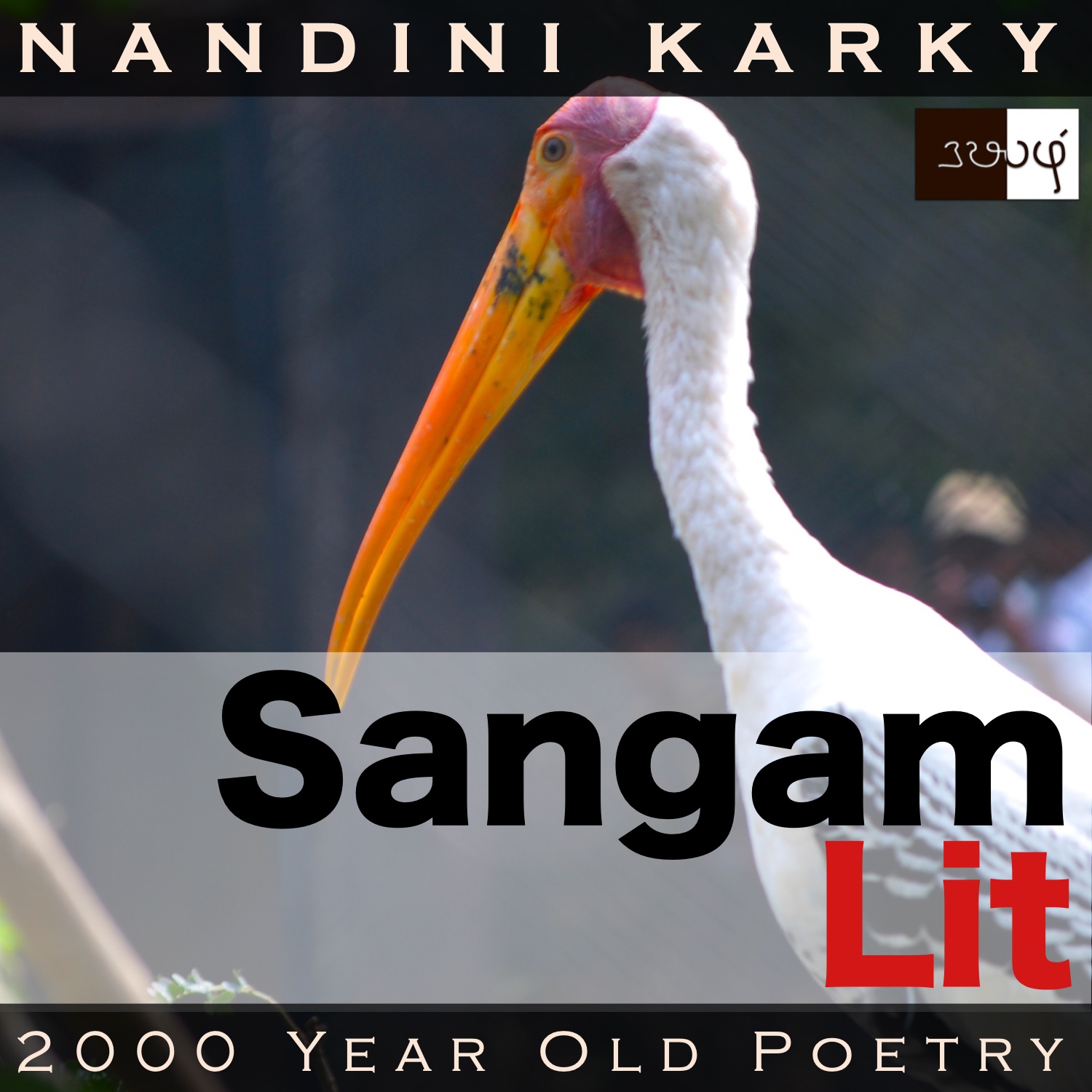Podcast: Play in new window | Download
Subscribe: Apple Podcasts | Spotify | Amazon Music | Android | iHeartRadio | Email | TuneIn | RSS | More

In this episode, we perceive scenes from the coast reflecting emotions within, as portrayed in Sangam Literary work, Natrinai 178, penned by an anonymous poet. Set in the coastal regions of ‘Neythal’, the verse speaks in the voice of the confidante to the lady, intending to convey a hidden message to the man, listening nearby.
ஆடு அமை ஆக்கம் ஐது பிசைந்தன்ன
தோடு அமை தூவித் தடந் தாள் நாரை
நலன் உணப்பட்ட நல்கூர் பேடை
கழி பெயர் மருங்கில் சிறு மீன் உண்ணாது,
கைதை அம் படு சினைப் புலம்பொடு வதியும்
தண்ணம் துறைவன் தேரே கண்ணின்
காணவும் இயைந்தன்று மன்னே; நாணி
நள்ளென் யாமத்தும் கண் படை பெறேஎன்;
புள் ஒலி மணி செத்து ஓர்ப்ப,
விளிந்தன்றுமாது, அவர்த் தெளிந்த என் நெஞ்சே.
As the poem opens with ‘ஆடு அமை’, the image of a ‘bamboo dancing’ in the breeze comes to mind. Appearing shortly thereafter, is a ‘நாரை’ or ‘stork’ and the ‘worrying mate’, ‘நல்கூர் பேடை’. The phrase ‘கண் படை பெறேஎன்’ talks about ‘eyes that get no rest’ and is portraying a case of insomnia in the Sangam age. The poem is rich in rhyme scheme with word combinations like ‘ஆடு – தோடு’, ‘தண்ணம் – கண்ணின்’ and ‘நள்ளென் – புள் ஒலி’ that resounds with the melody of a ‘bird call’ or ‘புள் ஒலி’. Let’s hear all the notes of this birdsong.
The man and lady have been in a love relationship and the man had been trysting with the lady by night. One night, when arrives to the lady’s house, the confidante pretending not to see him, tells the lady, “With a rounded bunch of feathers that look like the gently kneaded dough made from the shoots of a swaying bamboo, the worried female stork, which has mated with its long-legged male, shuns the small fish that flop on the shores of the creek and resides alone on the curved branch of the screw pine tree. The lord comes from such a shore. And now, there’s no sight of his chariots. In the midnight hours, suffering with shame, I’m unable to close my eyes and rest. I wake up startled, mistaking a bird call for the sound of his bells. Such ruin has fallen upon my heart that loves him!” A word of warning to tell you that in this instance, the confidante has assumed the voice of the lady to pass on a pointed message to the man. With these words, she lets the man know that the lady has been confined to the house and the best course of action would be for him to seek the lady’s hand in marriage.
Now, for the hidden nuances! The confidante first conjures up the image of a female sea bird that seems to be resting on the branch of a fragrant screw pine tree, refusing to eat the food that comes and falls its way. She informs us that this attitude is because the bird had recently mated and parted with the male bird. By etching an image of a bird that refuses to feed itself and sits looking worried on a branch, the confidante sets the mood of the disclosure. Although she depicts this scene to describe the lay of the man’s land, we know she means something more. The worried bird that shuns food is a metaphor for the lady, who in a state of pining, missing the man, remains unable to savour food. She then talks about how the lady hasn’t see the man’s chariot for long, which is an indication that the lady has been confined to the house. The confidante adds that as the lady lies sleepless at night, she is often startled by the sound of a distant bird, that resounds like the bells of her man’s chariot. The confidante thus describes the worried and anxious state of the lady, secretly urging the man to not let her suffer thus and to seek a formal union, so as to bring lasting joy to that lady in love.
The words of this verse sound like the symptoms from a medical textbook. Lack of appetite, loss of sleep, and anxiety. Sounds familiar? Indeed, the age-old symptoms of love depicted in epics and novels over the centuries are now, confirmed by science. Ancient metaphors and similes have turned into neurotransmitters and hormones in the twenty-first century. While the language has changed, asserting its victory over time, love remains!




Share your thoughts...